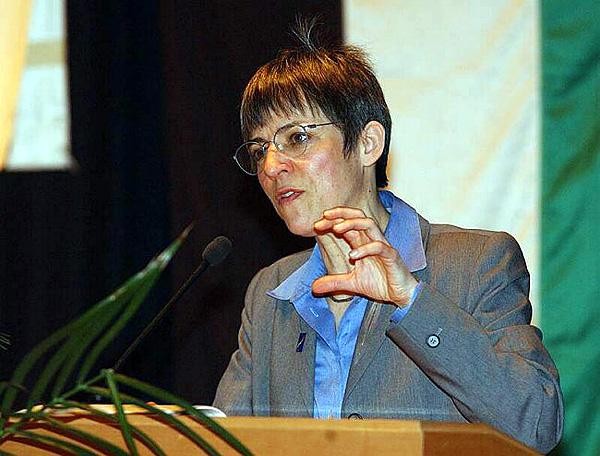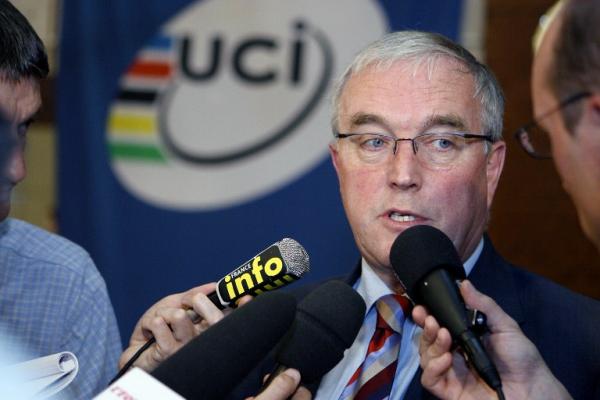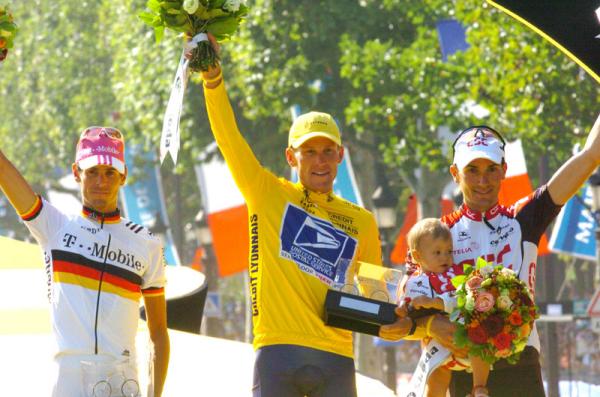Schenk doubts McQuaid has the credibility to clean up cycling
Former UCI member calls for fundemental changes to the culture of cycling



Sylvia Schenk, the former German federation president and UCI management committee member, has said that she doubts that UCI President Pat McQuaid has the credibility to clean up cycling.
Schenk's comments come after USADA banned and stripped Lance Armstrong of his seven Tour de France titles and several allegations have been laid at the feet of the UCI surrounding alleged collusion and the covering up of positive doping tests. The UCI has always denied that they have covered-up test results and McQuaid has gone on the record stating that corruption within the sport's governing body has never existed. However, the UCI's position has been questioned after USADA included the cover-up of positive tests in their statements to Armstrong and other individuals named in the US Postal investigation.
The UCI has altered its stance on the case, first stating that the matter was for USADA to deal with before bringing a case to a US court where they fought for but failed to attain jurisdiction of results management. They await the evidence from USADA, which has yet to be made public, while Armstrong chose not to fight charges leveled at him.
"There is a big effort needed in this historic situation in cycling to really change the sport. I doubt that McQuaid has the credibility to lead the reform that is needed," Schenk told Cyclingnews.
Schenk has previously called for an independent inquiry into the UCI's actions after it was confirmed in 2010 that they received donations from Lance Armstrong during the rider's career. The money was used to purchase a machine to analyze blood samples.
Although Schenk said that she had never been a witness of covering-up a positive test result during her time in the UCI management committee (from 2000 to 2005) she has raised concerns over the payments made by Armstrong, and in her opinion cites them as an example of how the UCI's credibility is undermined.
"What I learnt from the fight against corruption, that I've been working in since 2006 inside and outside of sport, is that you need a real zero tolerance approach to fighting corruption and as well doping and that you don't have in sport.
Get The Leadout Newsletter
The latest race content, interviews, features, reviews and expert buying guides, direct to your inbox!
"At that time when I was on the UCI management committee from time to time we had reports from Dr. Mario Zorzoli who was in the anti-doping department of UCI. He gave reports on their observations for example regarding the hematocrit limit of 50 and results pointing to riders trying to hit 49.9 but I didn't have individual rider's figures so I don't know who knew what about individual results.
"It was a difficult situation. Armstrong was a big champion and he was close to Verbruggen [former UCI President] and the others. That wasn't strange, if you have the big champion of a sport he's meeting the officials at many occasions. I don't know how close those two were, it wasn't unusual for an athlete like Armstrong, but what raised my suspicions at the time was when we first had information that there were payments made to the UCI by Armstrong, we only learned about it through the media. There was nothing in our meetings and I've looked at the minutes. We never had information of how much was paid and what the money was used for. All the statements made by the parties even after were contradictory."
In 2005 Armstrong told Cyclingnews: "I am a huge advocate of WADA, USADA, drug controls, random controls, out of competition controls. I have donated money to the UCI over the years to increase [drug controls]."
McQuaid was elected President in 2005 and was immediately faced with the fallout from Operacion Puerto and the positive test for testosterone from Floyd Landis - who the UCI is now suing. The Irishman was re-elected in 2009 and stated that the war against doping was a primary target. "It is an endless fight for the UCI, and one which I am determined that the UCI will continue for a further four years."
But Schenk points to his election in 2005 as an important moment.
"My proposal in 2005 was not to elect Pat McQuaid," Schenk told Cyclingnews.
"The delegates of the UCI elected McQuaid, though, and that's a big point as everyone looks back now. Everyone that elected McQuaid had a choice and they're all responsible for electing him.
"From my point of view it was a mistake to elect him. They voted for continuity, as McQuaid was promoted by Verbruggen, but real change needs a change of the responsible persons, too.
"Cycling, that's the UCI and the Tour de France, they're at a very important point in their history and it's about whether they try to go on as before with the people they've elected and keep hoping they can get off with it or whether they really are going to start with zero-tolerance, make fundamental changes to the culture of cycling, for example bringing in transparency and accountability, and implement all steps needed for a comprehensive anti-doping system. That would send a very strong message to sponsors - and the sponsors are more and more concerned regarding the integrity of sport - governments and all the stakeholders. That's what should happen. It will take a big effort and I don't know whether the people in charge have the energy and the credibility to do that."
Daniel Benson was the Editor in Chief at Cyclingnews.com between 2008 and 2022. Based in the UK, he joined the Cyclingnews team in 2008 as the site's first UK-based Managing Editor. In that time, he reported on over a dozen editions of the Tour de France, several World Championships, the Tour Down Under, Spring Classics, and the London 2012 Olympic Games. With the help of the excellent editorial team, he ran the coverage on Cyclingnews and has interviewed leading figures in the sport including UCI Presidents and Tour de France winners.
